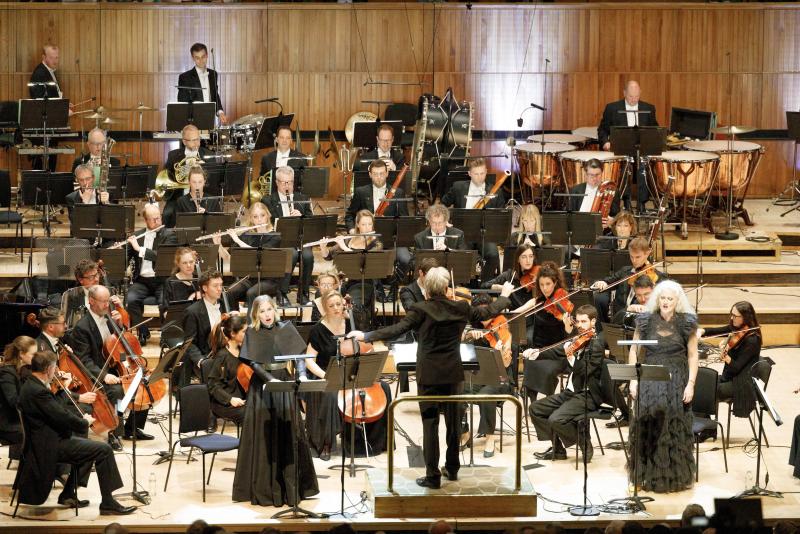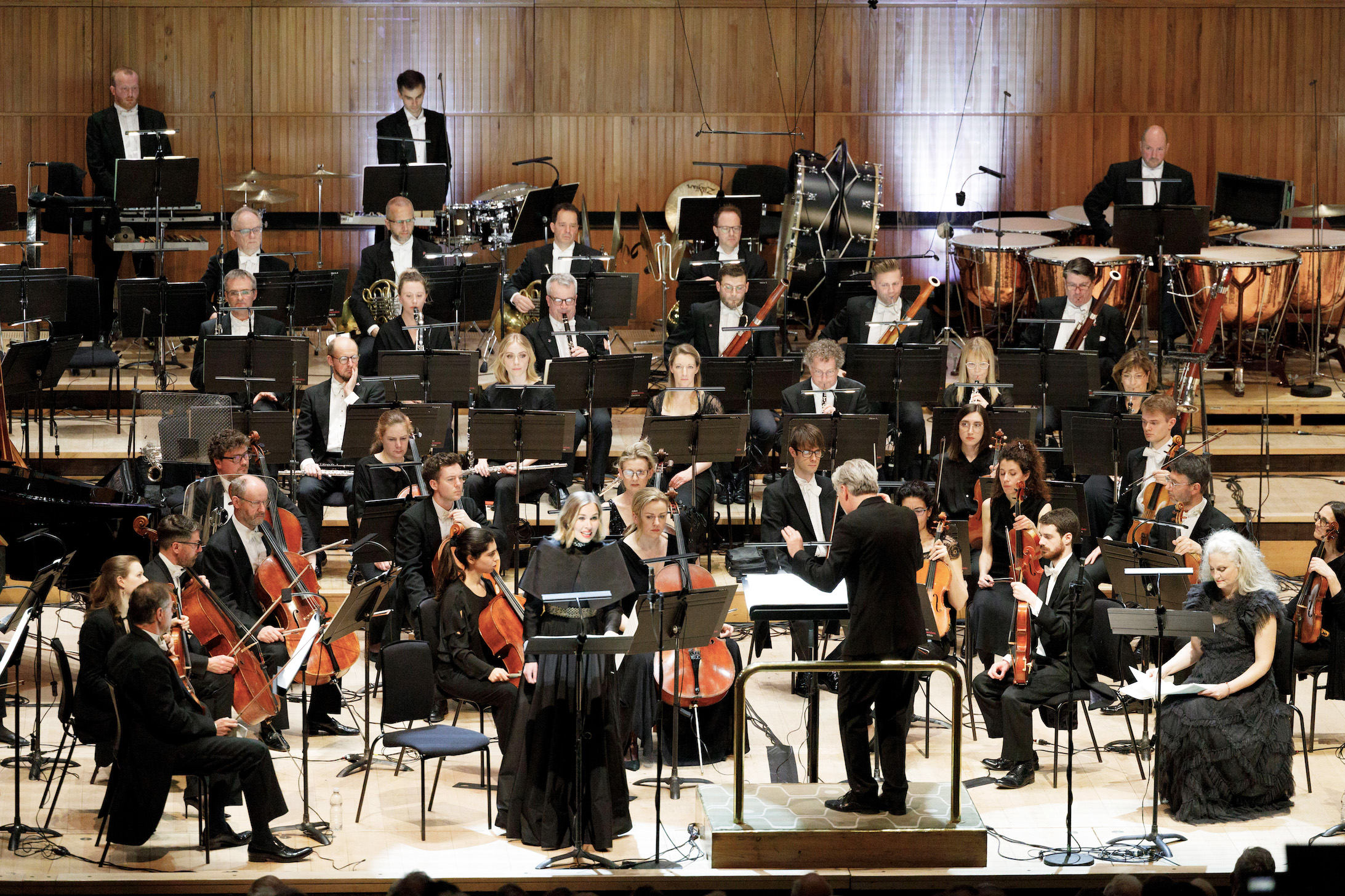Bell, Dreisig, LPO, Gardner, RFH review - royal rifts, and uplifting Mahler | reviews, news & interviews
Bell, Dreisig, LPO, Gardner, RFH review - royal rifts, and uplifting Mahler
Bell, Dreisig, LPO, Gardner, RFH review - royal rifts, and uplifting Mahler
Brett Dean's warring queens give way to a bracing journey through struggle to serenity

Brett Dean’s opera Hamlet will play at the Bavarian State Opera in Munich in June: the next stage of an acclaimed progress that began at Glyndebourne in 2017. Now on the last stretch of his three-year stint as composer-in-residence with the London Philharmonic Orchestra, the prolific and versatile Australian – formerly a violist with the Berlin Phil – evidently still has warring royal families on his mind.
From Schiller onwards (in his Mary Stuart), playwrights, librettists and screenwriters have eagerly forged the face-to-face clashes between the Tudor and Stuart divas that history never witnessed. Dean and Jocelyn do something subtler: the vocal parts for the cousin queens (Emma Bell’s Elizabeth; Elsa Dreisig’s Mary) stand alone as dramatic monologues but, at moments, harmonise into a musical version of the kinship that both women felt beyond their political and religious antagonisms.
 Will In spe contra spem evolve into a full-fledged opera? It felt, on this hearing, lacking in a true dramatic climax, even though Dean’s setting of the royal words, and his orchestral colours, had all the rich, tense and propulsive qualities we know he can command. Whereas Mary’s words come from private letters (in French) to her kinswoman and jailer, Elizabeth’s mostly derive from public statements. The music effectively captures this split between urgent, intimate appeals and performative, official justifications. Yet the piece really takes wing when these rival registers resolve into duets, or near-unison passages, voicing a solidarity that the forces of power and faith will strain and snap.
Will In spe contra spem evolve into a full-fledged opera? It felt, on this hearing, lacking in a true dramatic climax, even though Dean’s setting of the royal words, and his orchestral colours, had all the rich, tense and propulsive qualities we know he can command. Whereas Mary’s words come from private letters (in French) to her kinswoman and jailer, Elizabeth’s mostly derive from public statements. The music effectively captures this split between urgent, intimate appeals and performative, official justifications. Yet the piece really takes wing when these rival registers resolve into duets, or near-unison passages, voicing a solidarity that the forces of power and faith will strain and snap.
Both queens found forceful interpreters marked by different soprano shadings. Bell, initially at least, was imperious, even hectoring (“so clear from malice”, she claims, and ready to pardon rebels). Dreisig, meanwhile, found a more tender, lyrical vein, with a higher range, which caught the liturgical, piously Catholic style of Mary’s cries and pleas. Behind them the large orchestra growls, swoops, scurries and erupts in music of simmering agitation and unrest with perhaps too many glissando lurches. It leaps, for instance, into a busy perpetuum mobile as Elizabeth frets over the falsity of the monarch’s spotlit role (“We Princes are set on stages”). Then, in Dean’s most striking coup, gentle Tudor keyboards usher us back into the pastoral dreamland of Byrd, Morley or Gibbons songs as Elizabeth fantasises a simpler world: “Were we but as two milkmaids, with pails upon our arms”. Mary’s music half-resists, but then half-echoes, this lovely escapist idyll. Scuttling, nervous woods in a scherzo-like interlude presage the more overt tensions that close the piece. The two vocal lines wrangle or collide while chunky brass builds into an ominous foretaste of this story’s fatal end. Bell and Dreisig powerfully served a piece that felt, dramatically, still like work-in-progress – although the varied colours and dextrous ingenuity of Dean’s writing hinted at riches in store.
Musical conflicts turn both more intimate, and more universal, in Mahler’s Fifth Symphony. Gardner’s nimble, agile reading with the LPO dialled back on the metaphysical struggle. To compensate, he shone clear light on the thrilling local shifts between hope and despair, serenity and turbulence, that drive the development not just between the five movements but inside each. He mainly eschewed the grandiose or monumental style – though he can pack a climactic punch when required – in favour of more gracious, lucid and finely-pointed drama.
 From the opening trumpet fanfares onwards (Paul Beniston and colleagues had a stellar night), Gardner lent a loping, fluent touch to proceedings even as the score deepened into panic and frenzy. Maybe the funeral march, and the storm-bursts of the second movement, could have done with a little more sledgehammer doom at intervals – but with Gardner you heard a multitude of fine details as his neat, tight phrasing moved things along. The brass chorale struck with as much heavenly force as it should, while the skipping, slurring ländler of the middle movement felt more amiable than it sometimes can. This was irony tempered by proper rustic bonhomie rather then churning cynicism. The horn solos (new appointee 20-year-old Anne Marie Federle, bold, mellow and authoritative, led another of the evening’s high-achieving sections) spanned tenderness, introspection and menace. The mood-swings, though, sounded increasingly edgy and anxious as the movement progressed. Gardner always stayed alert to the swirling internal dramas within each act among the five.
From the opening trumpet fanfares onwards (Paul Beniston and colleagues had a stellar night), Gardner lent a loping, fluent touch to proceedings even as the score deepened into panic and frenzy. Maybe the funeral march, and the storm-bursts of the second movement, could have done with a little more sledgehammer doom at intervals – but with Gardner you heard a multitude of fine details as his neat, tight phrasing moved things along. The brass chorale struck with as much heavenly force as it should, while the skipping, slurring ländler of the middle movement felt more amiable than it sometimes can. This was irony tempered by proper rustic bonhomie rather then churning cynicism. The horn solos (new appointee 20-year-old Anne Marie Federle, bold, mellow and authoritative, led another of the evening’s high-achieving sections) spanned tenderness, introspection and menace. The mood-swings, though, sounded increasingly edgy and anxious as the movement progressed. Gardner always stayed alert to the swirling internal dramas within each act among the five.
In keeping with his overall approach, he made the Adagietto a love-song of soft-touch sensuality, the splendid LPO strings refined and poised rather than overwhelmingly lush. He kept it brisk too: under ten minutes, closer to Mahler’s own tempi than some hyper-romantic dawdlers. And the finale stayed faithful to its “giocoso” marking, loose-limbed but light-footed. We had sprightly good humour without too much manic joviality, and a thrillingly majestic reprise of the great brass chorale. When Gardner finally let his band off the leash, they exited in a burst of radiant splendour on a level that we hadn’t heard before. Other, more declamatory or meditative, Fifths may shake or stir you more. Still, the clear textures, deft rhythms and bright flavours of the LPO’s playing delivered plentiful blessings of their own.
rating
Share this article
Add comment
The future of Arts Journalism
You can stop theartsdesk.com closing!
We urgently need financing to survive. Our fundraising drive has thus far raised £49,000 but we need to reach £100,000 or we will be forced to close. Please contribute here: https://gofund.me/c3f6033d
And if you can forward this information to anyone who might assist, we’d be grateful.

Subscribe to theartsdesk.com
Thank you for continuing to read our work on theartsdesk.com. For unlimited access to every article in its entirety, including our archive of more than 15,000 pieces, we're asking for £5 per month or £40 per year. We feel it's a very good deal, and hope you do too.
To take a subscription now simply click here.
And if you're looking for that extra gift for a friend or family member, why not treat them to a theartsdesk.com gift subscription?
more Classical music
 Hallé John Adams festival, Bridgewater Hall / RNCM, Manchester review - standing ovations for today's music
From 1980 to 2025 with the West Coast’s pied piper and his eager following
Hallé John Adams festival, Bridgewater Hall / RNCM, Manchester review - standing ovations for today's music
From 1980 to 2025 with the West Coast’s pied piper and his eager following
 Kaploukhii, Greenwich Chamber Orchestra, Cutts, St James's Piccadilly review - promising young pianist
A robust and assertive Beethoven concerto suggests a player to follow
Kaploukhii, Greenwich Chamber Orchestra, Cutts, St James's Piccadilly review - promising young pianist
A robust and assertive Beethoven concerto suggests a player to follow
 Robin Holloway: Music's Odyssey review - lessons in composition
Broad and idiosyncratic survey of classical music is insightful but slightly indigestible
Robin Holloway: Music's Odyssey review - lessons in composition
Broad and idiosyncratic survey of classical music is insightful but slightly indigestible
 Classical CDs: Wolf-pelts, clowns and social realism
British ballet scores, 19th century cello works and contemporary piano etudes
Classical CDs: Wolf-pelts, clowns and social realism
British ballet scores, 19th century cello works and contemporary piano etudes
 Bizet in 150th anniversary year: rich and rare French offerings from Palazzetto Bru Zane
Specialists in French romantic music unveil a treasure trove both live and on disc
Bizet in 150th anniversary year: rich and rare French offerings from Palazzetto Bru Zane
Specialists in French romantic music unveil a treasure trove both live and on disc
 Scottish Chamber Orchestra, Ibragimova, Queen’s Hall, Edinburgh review - rarities, novelties and drumrolls
A pity the SCO didn't pick a better showcase for a shining guest artist
Scottish Chamber Orchestra, Ibragimova, Queen’s Hall, Edinburgh review - rarities, novelties and drumrolls
A pity the SCO didn't pick a better showcase for a shining guest artist
 Kilsby, Parkes, Sinfonia of London, Wilson, Barbican review - string things zing and sing in expert hands
British masterpieces for strings plus other-worldly tenor and horn - and a muscular rarity
Kilsby, Parkes, Sinfonia of London, Wilson, Barbican review - string things zing and sing in expert hands
British masterpieces for strings plus other-worldly tenor and horn - and a muscular rarity
 From Historical to Hip-Hop, Classically Black Music Festival, Kings Place review - a cluster of impressive stars for the future
From quasi-Mozartian elegance to the gritty humour of a kitchen inspection
From Historical to Hip-Hop, Classically Black Music Festival, Kings Place review - a cluster of impressive stars for the future
From quasi-Mozartian elegance to the gritty humour of a kitchen inspection
 Shibe, LSO, Adès, Barbican review - gaudy and glorious new music alongside serene Sibelius
Adès’s passion makes persuasive case for the music he loves, both new and old
Shibe, LSO, Adès, Barbican review - gaudy and glorious new music alongside serene Sibelius
Adès’s passion makes persuasive case for the music he loves, both new and old
 Anja Mittermüller, Richard Fu, Wigmore Hall review - a glorious hall debut
The Austrian mezzo shines - at the age of 22
Anja Mittermüller, Richard Fu, Wigmore Hall review - a glorious hall debut
The Austrian mezzo shines - at the age of 22
 First Person: clarinettist Oliver Pashley on the new horizons of The Hermes Experiment's latest album
Compositions by members of this unusual quartet feature for the first time
First Person: clarinettist Oliver Pashley on the new horizons of The Hermes Experiment's latest album
Compositions by members of this unusual quartet feature for the first time

Comments
Great review but please note
Many thanks,a nd apologies -